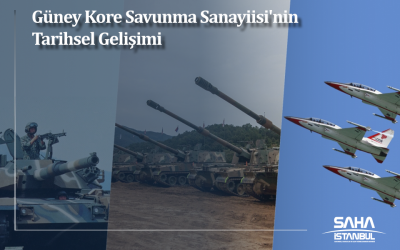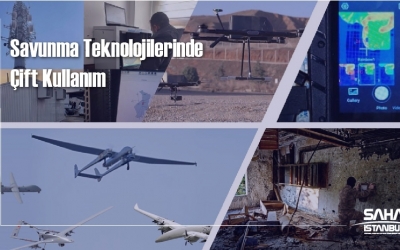
Strategic Importance of Africa: Natural Resources, Security, and Geopolitical Dynamics
Africa, with its rich natural resources, strategic trade routes, and rapidly increasing geopolitical importance, is a continent that attracts global attention. However, these advantages also place Africa in a position where it faces intense security threats, conflicts, and instability. Issues such as terrorism, border conflicts, piracy, and civil wars create significant gaps in the continent's security infrastructure, making it necessary for African countries to enhance their defense capacities and develop local defense industries. While investments in the defense industry in recent years reflect Africa's efforts to address these challenges, the continent still struggles with structural obstacles such as technological infrastructure deficiencies, dependence on external sources, and corruption.
In the face of this challenging scenario, Turkey's defense industry collaborations with Africa provide an important solution to strengthen the continent's security capacity. With advanced technology defense products and projects that support local production capabilities, Turkey is helping Africa both to deal with security threats and to strengthen its economic independence. Moreover, Turkey-Africa relations are not limited to developments in the defense industry but offer a deepening strategic partnership model that also encompasses diplomatic, economic, and cultural dimensions. This article aims to comprehensively examine the dynamics of security and the defense industry in Africa, while also exploring Turkey's role in this process and the potential for cooperation between the two sides.
Security Issues and Increasing Military Expenditures
Africa's natural wealth and strategic location make the continent a focal point in global economic and geopolitical balances, while simultaneously confronting it with serious security challenges. Terrorism, border conflicts, civil wars, and piracy are key security threats that undermine the continent’s stability and negatively impact its development goals. The Sahel region, in particular, has become an area of intense terrorist activity, complicating Africa’s security dynamics further.
These security issues have made the need for African countries to increase their military capacities and invest in defense industries even more apparent. In 2023, the total military expenditures of African countries rose by 22% compared to the previous year, reaching $51.6 billion, which is a concrete indicator of this necessity. These expenditures reflect not only the need to meet the continent's security requirements but also efforts to strengthen international military cooperation. African countries aim not only to secure their internal stability but also to play a more active role in maintaining peace and stability across regions.
The continent's rich natural resources position Africa as a strategic power center, not only in terms of economic growth potential but also in terms of geopolitical influence. However, these wealths have sometimes led to competition and conflicts, deepening security issues rather than bringing prosperity. Struggles for control of underground resources and frequent conflicts in border areas are among the factors threatening Africa’s stability.
To overcome its security challenges and achieve a stronger position in defense, Africa will need to develop local defense industries and use military expenditures effectively. In this context, it is crucial that investments in the defense industry focus on supporting local production rather than relying solely on external procurement. Countries like South Africa, Egypt, and Nigeria, which have made progress in this field, aim to become regional leaders in the defense industry.
Africa’s future depends on the effective management of its natural resources, the development of structural solutions to security threats, and the leveraging of its geopolitical opportunities. In this regard, deepening international collaborations and strategic partnerships will play a critical role in achieving the continent's security and defense objectives. When security and stability are ensured, Africa will not only support peace and development within its own borders but will also become a more influential actor in global power dynamics.
Turkey's Strategic Defense Partnerships with Africa
Turkey has played a significant role in addressing Africa's security and defense needs through strategic partnerships in the defense industry. Over the past 20 years, the increasing conflicts and intensifying security threats in Africa have paved the way for the acceleration of these collaborations. Turkey’s defense industry projects not only reduce the dependency of African countries on foreign suppliers but also contribute to the enhancement of local production capacities. Moreover, these projects serve as a diplomatic tool that strengthens Turkey's regional influence.
One of the most tangible examples of Turkey’s defense contribution to Africa is the Bayraktar TB2 UAVs produced by Baykar. These systems have changed the course of civil wars in countries such as Libya and Burkina Faso, providing significant contributions to regional security and stability. Similarly, the Atak helicopters delivered by TUSAŞ to Nigeria have increased the country’s counterterrorism capacity, while ASELSAN's radar and electro-optic systems provide crucial technological solutions to enhance border security. These advanced defense products offered by Turkey provide strong support to African countries in addressing their security vulnerabilities.
Turkey's contributions in the defense field extend beyond technology transfer; it has also deepened cooperation with African countries in areas such as military training and capacity development. For example, military training and exercise agreements with Uganda have been an important step in enhancing the skills and knowledge of local defense personnel. The use of HİSAR air defense systems in Libya has increased the region’s airspace security, creating a strategic impact. These collaborations demonstrate how Turkey’s defense industry has become a critical player in the security dynamics of Africa.
Turkey’s strategy toward Africa is also notable in the diplomatic sphere. Designated as a "Strategic Partner" by the African Union in 2008, Turkey continues to strengthen its political and economic relationships across the continent. In 2022, during the "Third Ministerial Review Conference of Turkey-Africa Partnership," Turkey's Foreign Minister Hakan Fidan met with the foreign ministers of 14 African countries, further deepening partnership ties. Such diplomatic initiatives ensure that defense industry collaborations are embedded within a long-term strategy.
The growth of Turkey's defense and aerospace exports to Africa also highlights the economic dimension of these partnerships. Defense and aerospace exports, which stood at $83 million in 2020, reached $460 million in 2022. This increase clearly indicates the rising demand for Turkey's defense projects in Africa and the success Turkey has achieved in this field.
Figure 1: Turkey-Africa Defense and Aviation Exports (2020-2022 in million $)
SAHA Blog

Overview of Tanks on the Battlefield: Russia-Ukraine War

Enhancing Global Security in Civil Aviation: The Crucial Role of Air Defence Systems

Uzay Savaşının Gelişen Askeri Doktrinler ve Strateji Üzerindeki Etkisi

Historical Development of the South Korean Defense Industry

Biyosavunma: Doğanın Gücünden İlham Alıyor

Güç Gösterisinde Etkili Bir Savunma Stratejisi: A2/AD Doktrini

Savunma Teknolojilerinde Çift Kullanım



